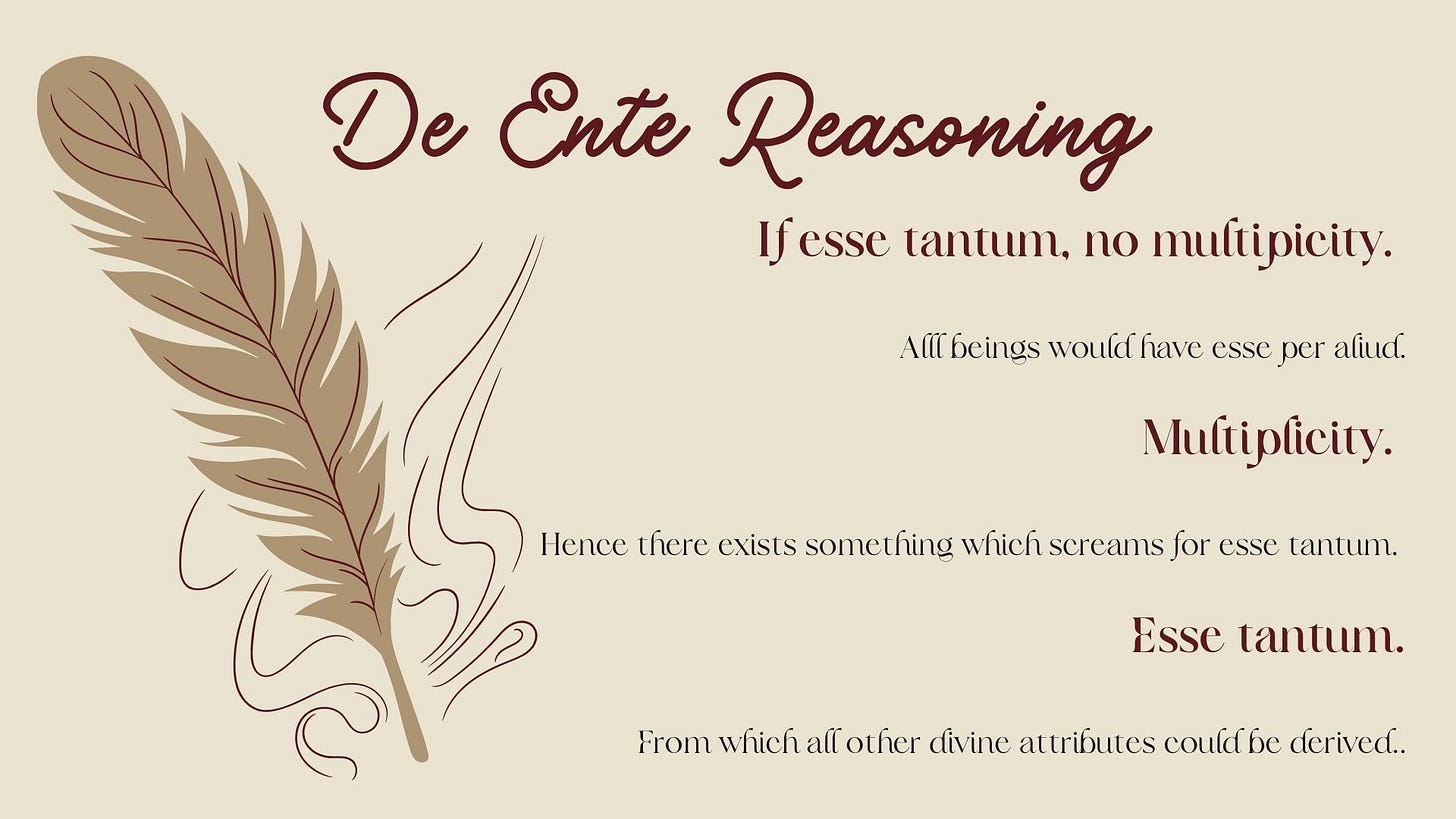Contingency Does Entail the Real Distinction: A Response to Flynn
Some thoughts on Thomistic cosmological reasoning
Flynn argues that contingency does entail the real distinction between existence and essence because he finds such argumentation to miss an important Thomistic point: that even when we collapse essence to esse (existence) in creatures thereby irendering them identical, such essence-existence non-composite is still ultimately contingent on God's creative act. Hence, contingency and being essence-existence composite are not mutually entailing.
A slide I used during a lecture I gave on December 19, 2022.
I think Flynn here is making an important point, but one that does not prove his claim that contingency does not entail the real distinction. How so?
Notice that he rests his criticism on the conceivability of contingent essence-existence non-composites. Specifically, these contingent essence-existence non-composites that he appeals to are those beings whose essences are identical to ens commune, not ens divinum.
But for his criticism to work, he must prove not only the conceivability of such entities, but also their actual possibility. After all, to be conceivable need not entail being actually possible (As Pat knows, things popping into existence out of pure nothingness is conceivable, but not actually possible). If it is actually impossible for there to be entities that are simultaneously contingent and essence-existence non-composites, then Pat has not proven that to be contigent and to be essence-existence composite are not mutually entailing.
The crucial question is: could we collapse essence to creaturely esse (ens commune) thereby rendering such entity essence-existence non-composite? I think not. If anything has its essence identical to its existence, then to be what it is is to be real. Its nature demands it to exist. If it does not exist, it's not what it is. Since it is what it is, it has to exist. Hence, all essence-existence non-composites have to be necessary.
As necessary, IT AUTOMATICALLY CANNOT BE CONTINGENT ON ANYTHING ELSE, even if that something else is God. Hence it follows from this that such essence-existence non-composite CANNOT NOT BE GOD. Hence it follows from this that it is actually impossible to collapse essence to creaturely (non-God) esse. In the real world, if anything's essence and existence are really identical, then it follows from this that such being is contingent on nothing and thus absolutely necessary.
Hence we have defended the mutually entailing relationship between contingency and being essence-existence composite. Let me just conclude with a review of my primary justification of the other side of the relationship: of why if anything has its existence really distinct from its essence, it follows that it has to exist contingently.
Notice that both essence and existence are internal principles of a being, with nature determining such being to a particular mode of existing, and existence making that particular mode of existing real. It follows then that existence flows from (and is configured and individuated by) such essence either necessarily or contingently.
If the latter (the existence of such essence-existence non-composite flows from its essence contingently), then it does not necessarily follow for such being to be real simply because it possesses the kind of essence that it has.
The former (the entity has both properties simultaneously: the real distinction between essence and existence, and existence necessarily flowing or following from the essence) is impossible since it is an ontological contradiction. Notice that existence here by supposition flows from the nature. But for there anything to flow from nature, nature must first be there. But what makes nature "there" or real, but existence? Hence we have here a case of a being's existence both being posterior to and not posterior to its nature—an ontological contradiction. Hence, if anything's essence and existence are distinct, the only possibility left is for such being not to be that whose existence is entailed by its nature. In other words, if anything is an essence-existence composite, then it cannot be necessarily existing. It, instead, is contingent.
So far, we have a positive argument for the real distinction entailing contingency, and a negative argument (a defense) of contingency entailing the real distinction. Can we launch a positive argument for contingency entailing the real distinction? I think so.
I think it's analytically true that anything contingent is not pure existence (hence the real distinction does not apply to it). How so? If some real aspect of an entity is contingent on anything else, then of course it is not pure existence but existence qualified in some way by some reality that is extrinsic to the nature (either an intrinsic principle of the thing like an accident, or an extrinsic principle). That is because if an entity is qualified in some way by some feature, that feature must be extrinsic to the nature that is identical to existence and thus is not encapsulated by the necessity of such nature. Hence, if some entity is contingent, then there is some real feature in it that falls outside the nature that is necessary due to its identity with existence.
But if anything does not possess a real distinction between existence and essence, there cannot be such real feature that falls outside such nature, for then its existence would be both identical to such nature and not identical to such nature at the same time, for such existence also extends to something extrinsic to the nature (the real feature distinct from the nature that qualifies the entity). This makes contingency and having no real distinction between essence and existence mutually exclusive. Hence, we now have a positive case for contingency entailing a real distinction.




